Berlin
 Last week I attended a conference in Berlin. Basically it was a venue to brag about how much money they pump into student exchange programs and to show off. The entire week was about "networking" and, note the lack of sarcasm here, a shortage of any substantive panel discussions plus a bunch of tours that were limited to twenty (20) participants each. Since the convenors were German they actually stuck to this attendance policy (although I did not hear that anyone was reprimanded for not showing up). I suppose I am slightly disgruntled because I was not allowed to go on all the tours I wanted. Or perhaps because my bankcard was denied at all ATMs, which meant that I had to sponge off everyone else or starve slowly by eating the standard finger-food "dinner" provided at receptions. (The other option was to starve more quickly in the endless lines at the buffet tables.) Evening receptions were also wrapped up at exactly the time listed on the conference program, which of course nipped any networking a person had finally got the guts to engage in, in the bud.
Last week I attended a conference in Berlin. Basically it was a venue to brag about how much money they pump into student exchange programs and to show off. The entire week was about "networking" and, note the lack of sarcasm here, a shortage of any substantive panel discussions plus a bunch of tours that were limited to twenty (20) participants each. Since the convenors were German they actually stuck to this attendance policy (although I did not hear that anyone was reprimanded for not showing up). I suppose I am slightly disgruntled because I was not allowed to go on all the tours I wanted. Or perhaps because my bankcard was denied at all ATMs, which meant that I had to sponge off everyone else or starve slowly by eating the standard finger-food "dinner" provided at receptions. (The other option was to starve more quickly in the endless lines at the buffet tables.) Evening receptions were also wrapped up at exactly the time listed on the conference program, which of course nipped any networking a person had finally got the guts to engage in, in the bud. 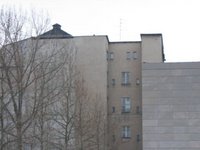 I was not as enchanted as I was with Vienna. Berlin is more vibrant. It's also more expensive than Vienna. As you can see from the illustration, the removal of grey paint from East German buildings is almost completed... The city is also known for "progressive" social mores and wide cultural diversity, which was a welcome relief/variety for the Czech and Slovak delegates. I particularly enjoyed the trip to the Turkish market with Megan and the wonderful Indian food. (It was so good to have a bit of spice on the palette. Even my American colleague Tim and his girlfriend, who invited me over for dinner, cooked a just-spicy-enough dim aloo.)
I was not as enchanted as I was with Vienna. Berlin is more vibrant. It's also more expensive than Vienna. As you can see from the illustration, the removal of grey paint from East German buildings is almost completed... The city is also known for "progressive" social mores and wide cultural diversity, which was a welcome relief/variety for the Czech and Slovak delegates. I particularly enjoyed the trip to the Turkish market with Megan and the wonderful Indian food. (It was so good to have a bit of spice on the palette. Even my American colleague Tim and his girlfriend, who invited me over for dinner, cooked a just-spicy-enough dim aloo.) 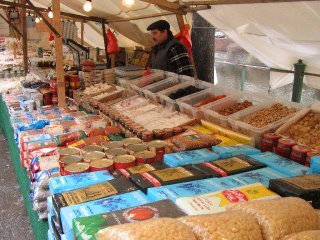
There is also the question of transparency in society, which extends of course to national politics. There's never enough. What is really going on? What are those politicians doing and why? To compensate for the perceived lack of such transparency, the hotel featured glass bathrooms. (Sorry, did I just steal one of the "jokes" from the preliminary opening speeches? oops.) The bathrooms were of great interest since the majority of roommates were unacquainted at first, as is standard for students at any conference of this sort. As they say, a man who lives in a glass house is either German or an exhibitionist. This described only a few conference participants, so the hotel wasn't exactly "number one" in our book. It was still pretty nice, though.
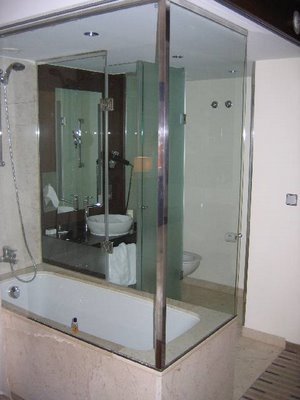
We also saw the impressively unintelligible and uninspiring installation Hommage à Picasso by Hanne Darboven at the Deutsche Guggenheim. The installation was about time and originality. Rich possibilities. As the brochure has it, Darboven’s "realization that the digits designating dates on the Gregorian calendar could serve as a neutral, 'graphic equivalent for the basically nonvisual phenomenon of time' allowed her to engage in the satisfying act of writing without describing. . . . She also incorporated into many of her works the German word Heute, meaning 'today', which she crossed out to depict the transformation of the present into the past" (quoting Klaus Honnef). Deep thoughts. Fortunately, it was free on Mondays. Even so, Alex and I spent a few euros on discounted 2006 planners. Possibly the endless calendrical number sheets that comprise most of the exhibit addled our sense of time. The exhibition is open until April 2006.
Then there were the Academy Awards which, though not all of us found them on television (and those of us who did did not inform everyone), were unsatisfying to most viewers. Brokeback Mountain, an adaptation of Annie Proulx's short story, was profound and visceral. Should it have won more awards? I don't know, and I have not seen the competition. However, Proulx's caustic expose of the award ceremony captured some of my feelings about the whole event. Somehow, in fact, it vaguely reminds of a certain conference . . .
After a good deal of standing around admiring dresses and sucking up champagne, people obeyed the stentorian countdown commands to get in their seats as "the show" was about to begin. There were orders to clap and the audience obediently clapped. From the first there was an atmosphere of insufferable self-importance emanating from "the show" which, as the audience was reminded several times, was televised and being watched by billions of people all over the world. Those lucky watchers could get up any time they wished and do something worthwhile, like go to the bathroom. As in everything related to public extravaganzas, a certain soda pop figured prominently. There were montages, artfully meshed clips of films of yesteryear, live acts by Famous Talent, smart-ass jokes by Jon Stewart who was witty and quick, too witty, too quick, too eastern perhaps for the somewhat dim LA crowd. . . .
Everyone thanked their dear old mums, scout troop leaders, kids and consorts. More commercials, more quick wit, more clapping, beads of sweat, Stewart maybe wondering what evil star had lighted his way to this labour. Despite the technical expertise and flawlessly sleek set evocative of 1930s musicals, despite Dolly Parton whooping it up and Itzhak Perlman blending all the theme music into a single performance (he represented "culchah"), there was a kind of provincial flavour to the proceedings reminiscent of a small-town talent-show night. Clapping wildly for bad stuff enhances this. (In full)
Pardon the long quote, but I like Proulx's prose. I wonder where she learned to cut to the quick so quickly. Her commentary also led me to a review that captures some highlights of the film and story.
Of course, the trip had its high points. There was a fabulous concert, and the headliner was my Prague friend Hubert. (Well, he was actually the only living composer featured in the entire evening, so he didn't have much choice.) Then there was the public art of Berlin. Scantily clad for the most part, but they use that fabric in other, more surprising, ways...

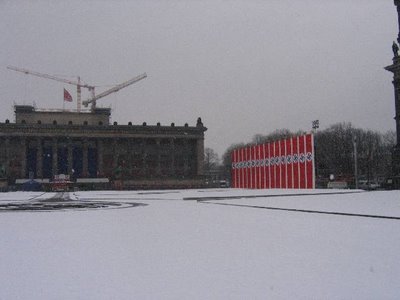
And in fact the city did grow on me quite a lot. Here was something GKJ might have liked.
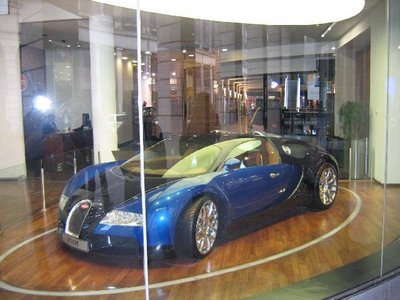
 A graduate student in music and anthropology writing a dissertation about music in Moravia, the eastern third of the Czech Republic. At some point, the Czech Republic's "second city" (that would be Brno) captured my attention, and I've since been blogging about events, arts, music, and other stuff—basically whatever interests me in and around the cityscape. I'm not living in Brno now, but I keep up with the cultural pulse from afar as best I can.
A graduate student in music and anthropology writing a dissertation about music in Moravia, the eastern third of the Czech Republic. At some point, the Czech Republic's "second city" (that would be Brno) captured my attention, and I've since been blogging about events, arts, music, and other stuff—basically whatever interests me in and around the cityscape. I'm not living in Brno now, but I keep up with the cultural pulse from afar as best I can.


Comments:
Even if you aren't actually Proulx, sometimes you're pretty close. Much evil amusement on this end.
10:38 AM, March 15, 2006
woah! what's up w/ the swastikas? Obviously a film shoot or something but it certainly is startling!
2:52 PM, March 15, 2006
Yes, the area was fenced off and signs were up explaining that they were filming something set in January of the 1940s. It was of great interest to us tourists, but there were more than a few skinheads who also were taking pictures. When I walked by the day before all the swastikas were covered by black cloth.
11:07 PM, March 17, 2006
» Post a Comment